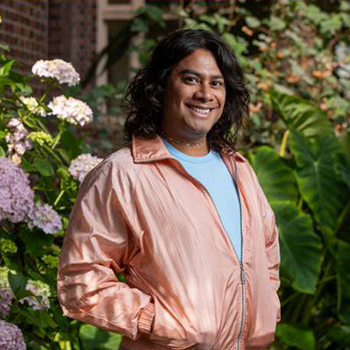UC People: Lusirena, on being their truest self
Share This Article

By the UCSF Newsroom
A Q&A with Lusirena (pronouns they/them), clinical research supervisor, Division of HIV, Infectious Diseases & Global Medicine, UCSF.
How does the Gender Recognition and Lived Name Policy affect you personally? Or how do you imagine or hope it might affect you?
My name is Lusirena, a siren from the Pacific Coast of Mexico. My lived name is very special to me not only because it is representative of my roots, but it is also reflective of my present, truest self. Being your truest self is a privilege, one that not everyone gets to experience in this lifetime.
The world can be a scary and unsafe place for trans and gender-expansive people. We don’t always have the protected freedom to be, to exist. This reality is precisely why leading institutions like UCSF are important in creating and sustaining safe spaces for the trans and gender-expansive people that we serve and employ.
The Gender Recognition and Lived Name Policy ensures that all members of the UCSF community have university-issued identification documents and displays of personal identification information that recognize their accurate gender and lived name. This policy allows trans and gender-expansive people to be recognized and respected as their truest selves.
Being recognized and respected as our truest selves fosters an environment of safety and belonging in the workplace. It significantly improves our emotional and psychological well-being and allows us to not only show up as our truest selves, but our best selves for patients and each other.
What’s one thing you would like people to know or understand about you and your experience?
Trans and gender-expansive people have existed on this earth for centuries. We exist in the past, present and future. Trans and gender-expansive people have loved, healed and led many Indigenous cultures across time, space and geography. We have always been here, despite our historical erasure. But although we have been historically erased, we are paradoxically hyper-visible in the present. This historical erasure and contemporaneous hypervisibility can create a complex lived experience for us — one that we ourselves are constantly trying to understand.
If you want to gain a better understanding of the trans and gender-expansive experience, do your research and befriend a trans person. The first trans person I ever befriended and loved was myself and I have learned and grown so much through this process. I believe you can too.
Names and pronouns are not just important to trans and gender-expansive folks. They are important to everyone.

“Nothing brings me more joy than hearing someone address me using my pronouns.”
— Lusirena
What’s something you wish more people did when getting to know you, especially at work?
I am nonbinary. I am not a man. I am not a woman. I am both and neither at the same time.
I understand that this can be very perplexing, especially being socialized in a rigid binary world. North/south, black/white, yes/no, he/she. Sometimes it feels like there is no room for the in-between. However, the in-between is always there. Northwest, grey, maybe, they/them; that’s me!
As a nonbinary person, I use they/them pronouns and I wish people would address me accordingly when getting to know me. Nothing brings me more joy than hearing someone address me using my pronouns.
Something that could help ensure that I am addressed correctly is having a pronoun badge buddy. This truly makes a difference. At my previous institution, I raised the same concern, which led to the development of pronoun badge buddies across the School of Medicine. It was one of my proudest accomplishments during my tenure there. Not only did it bring me joy, but it also allowed other trans and gender-expansive colleagues to be seen and respected in the workplace. Hopefully, it brought some queer joy to them the same way it did for me.
What would you change?
I love being nonbinary, but it can feel a bit isolating at work sometimes.
At the time of this writing, I only know one other nonbinary colleague. I want to know more. Having a supportive community is important, and creating an employee diversity group for trans and gender-expansive employees would be a great way to build community. I am based at Pride Hall on the Zuckerberg San Francisco General Hospital and Trauma Center campus and I often times feel disconnected from the larger UCSF community.
Having an employee diversity group for trans and gender-expansive people and our allies at Pride Hall would make us feel valued and supported. It would allow us to meet each other, build community and strengthen our presence and recognition not only at Pride Hall and the hospital, but also across UCSF.
